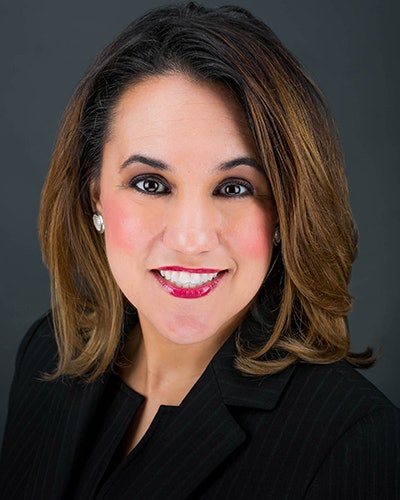The Beginning
With generous support from Lumina Foundation and The Pew Charitable Trusts, the Community College Survey of Student Engagement (CCSSE) was developed in 2001 as a tool that community and technical colleges could use to systematically collect important information about their students’ educational experiences.
 Linda L. García
Linda L. García
Dr. Kay McClenney, founding CCCSE director; senior consultant to the president & CEO, American Association of Community Colleges; and senior fellow, National Center for Inquiry & Improvement, says, “We sought to promote transparency, accountability, and institutional improvement, and to serve as a spotlight for the field to identify those educational issues that community colleges have to contend with — the ones they already are facing and the ones that are coming to them — so we could illuminate effective educational practices in a way not previously available to the colleges.”
The National Advisory Board (NAB) has been a major contributor to CCCSE’s growth. Since the very beginning, NAB has provided guidance around the issues that community colleges encounter when addressing student success. Dr. Dan Phelan, president of Jackson College and current CCCSE board chair, says, “We come together with a thoughtful purpose and passion. We think about student engagement and helping students be successful. The board is committed to this work.”
Colleges around the country are committed to the work as well. The data collected from CCCSE survey instruments have become something many institutions depend on when creating strategic plans and working on improvement efforts. Dr. Sunita “Sunny” Cooke, MiraCosta College president, explains, “Only by truly listening to students can we really be sure that what we are intending to do and what our students are actually experiencing are aligned.”
The focus group work
In order to illustrate the “why” behind the “what” of the data and to remind colleges that the survey results represent real voices, CCCSE has conducted focus groups with countless students, faculty, and staff over the last two decades. Across myriad hours of focus group footage, participants at colleges across the country have consistently spoken to several themes around engagement and success. In the coming months, CCCSE will share curated playlists that illustrate these themes:
● Engagement Doesn’t Happen by Accident, but by Design
● Students Don’t Do Optional
● Students Don’t Know What They Don’t Know
● What Happens When Expectations Meet Reality
● Relationships Matter
● Active and Engaged Learning Matters
● High Expectations Matter
● Student Support Services Matter
● Having a Plan Matters
● Issues of Equity Matter
 Courtney Adkins
Courtney Adkins
Vice President of Development at Temple College & Executive Director of the Temple College Foundation and former CCCSE Executive Director Dr. Evelyn Waiwaiole says one of her favorite CCCSE video clips is of a student explaining that student success is everybody’s responsibility on the college campus “from the time you come into the parking lot to the person who is your financial aid advisor to your instructor.” Waiwaiole continued, “He named all these different people. He didn’t even know he was talking about engagement.”
What’s Next for CCCSE
While CCCSE remains committed to providing colleges insights that matter about student engagement, it is also committed to evolving and growing in order to best support its partners fighting the good fight at institutions across the country.
One of the ways in which CCCSE has expanded its offerings to the field is by producing national reports focused on timely topics of interest — most recently, a publication on the impact of COVID-19.
 Coral Noonan-Terry
Coral Noonan-Terry
In 2020, CCCSE recognized that it would be remiss if it did not offer colleges a standalone tool for collecting vital information about their students’ experiences with racism, inclusion, and belonging on their campuses and in their communities — so with expert guidance, CCCSE staff developed such a tool. Dr. Michael Baston, president of Rockland Community College, says, “You can’t talk about inclusive excellence if you don’t include people in meaningful dialogue — whether they be faculty, staff, or students that help us build bridges to each other.”
Throughout fall 2021 and spring 2022, CCCSE will conduct a series of longitudinal focus groups, designed to augment the national data about term-to-term persistence and to help the field understand why more students are not successful.
The team at CCCSE feels so fortunate to have been able to share the student experience and inform positive change at community colleges across the country for the last 20 years, and they plan to continue doing just that as the organization moves into its third decade.
Dr. Linda L. García is executive director, Dr. Courtney Adkins is assistant director of publications, and Dr. Coral Noonan-Terry is program manager of special projects at the Center for Community College Student Engagement (CCCSE). The mission of CCCSE is to provide “aha” moments about the student experience. Follow CCCSE on Twitter: @CommCollSurveys.
Follow along with CCCSE over the next year as it celebrates its anniversary.
The Roueche Center Forum is co-edited by Drs. John E. Roueche and Margaretta B. Mathis of the John E. Roueche Center for Community College Leadership, Department of Educational Leadership, College of Education, Kansas State University.
This article originally appeared in the September 16, 2021 edition of Diverse. Read it here.


















